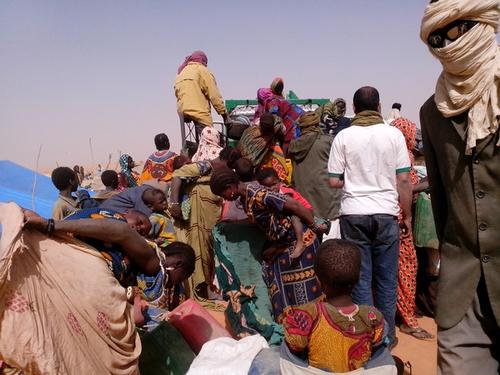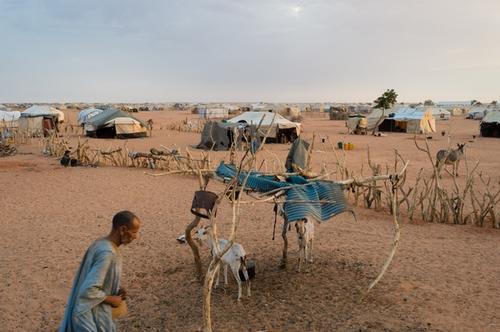Conflict in the north of Mali is still causing massive movements of people across the Sahel region and the unacceptable conditions in the camps where they are living are leading to disease and suffering.
According to the UNHCR, the UN refugee agency, approximately 150,000 refugees are living in camps in Burkina Faso (Ferrerio, Dibissi, Ngatourou-niénié and Gandafabou camps), Mauritania (Mbera camp) and Niger (Abala, Mangaize and Ayorou camps). Médecins Sans Frontières (MSF) has been working in these eight camps since March 2012, providing basic healthcare and maternal care, and treating malnutrition. MSF is also giving basic care and measles vaccinations to children aged between six months and 15 years. Nearly 12,000 consultations and 5,000 vaccinations have been carried out since the beginning of the year.
“At the border crossing at Fassala, Mauritania, people are arriving thirsty and showing signs of fatigue,” says Karl Nawezi, MSF project manager in Mauritania. Nearly 67,000 refugees – mainly women and children – have arrived in the border town of Fassala, since January 2012. Many have travelled by truck or with donkeys. After being registered by the authorities, the refugees wait in a transit camp before being transferred to Mbera, a small, isolated village in the Mauritanian desert, just 30 km from the Mali border.
Poor conditions in the camps
“In Mauritania, as is the case elsewhere, people are suffering from diarrhea, respiratory infections and skin infections because of the poor conditions in the camps,” says Nawezi. In Mbera, the refugees are totally dependent on humanitarian aid.
To date, the number of tents that have been distributed has been insufficient. Families have been assembled under large tents called ‘meeting points’, which leave them exposed to the elements. Fed up with waiting, some have taken it upon themselves to construct makeshift shelters out of straw mats and pieces of fabric in order to protect themselves from sand and dust storms.
Families fleeing in panic
Last year people were moving across the border in an organized way, but following the recent increase in military activity in Mali about 14,000 refugees have fled Timbuktu, Léré, Goundam, Larnab and Nianfuke in panic. Many have arrived with almost nothing, after journeys of several days. “Recent developments in the conflict have caused panic. People have just fled, fearful of getting caught in the crossfire,” says Nawezi.
Malnutrition a constant concern
In November 2012, a nutritional survey taken in Mbera revealed that nearly one in five children (17 percent) was malnourished and that 4.6 percent of children were suffering from the most severe form of malnutrition upon arriving at the camp.
“The main challenges are to ensure that children are vaccinated against disease, protected from malaria and have access to food that’s appropriate to their needs,” says Nawezi. The MSF medical teams have expanded their activities to prevent and treat severe malnutrition.
Staff have set up therapeutic feeding centres to care for the most malnourished children. These facilities have already admitted 1,000 children across the three bordering countries. Once admitted, patients are given special milk and nutrient-rich therapeutic food. As malnourished children are more susceptible to illnesses like measles, malaria, and diarrhea, their health must be monitored closely.
MSF is an independent medical humanitarian organization that provides healthcare while observing the principles of impartiality and neutrality. MSF does not receive any government funding for its activities in Mali, which are financed entirely by private donations. MSF is working in Timbuktu, Gao, Ansongo, Douentza, Konna and Mopti, and has been managing a 350-bed pediatric hospital in Koutiala, southern Mali, since 2009. MSF has been working in Mali since 1992.





